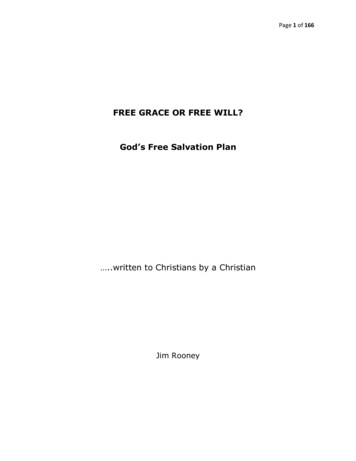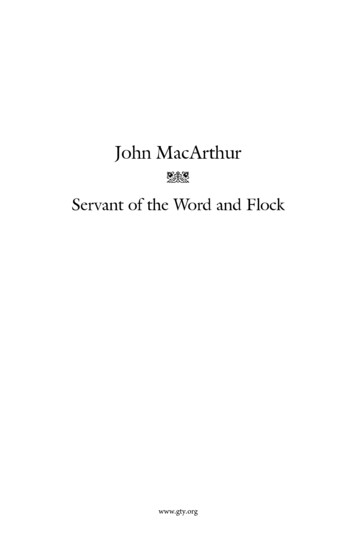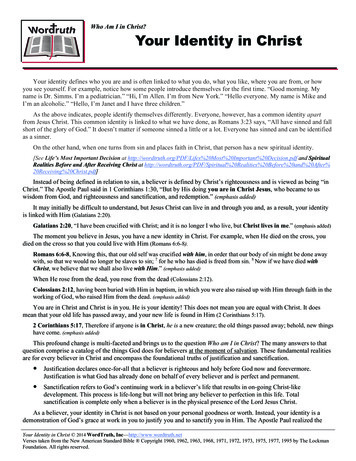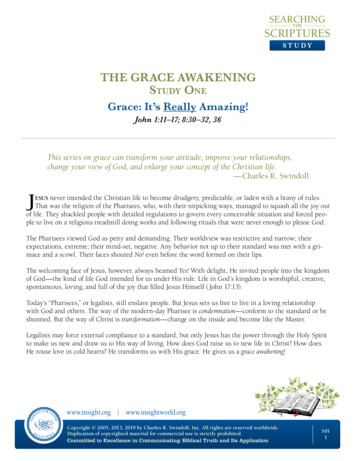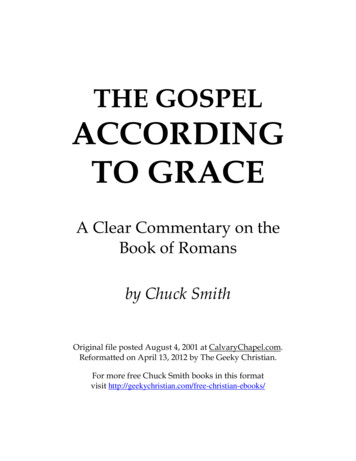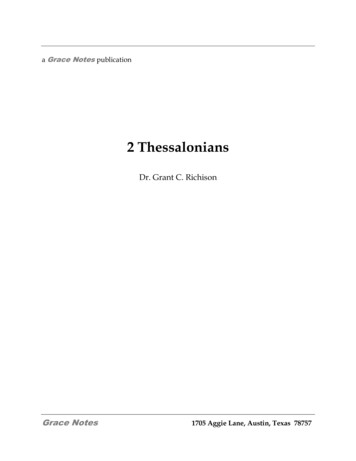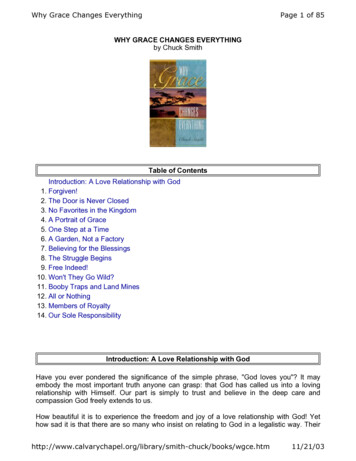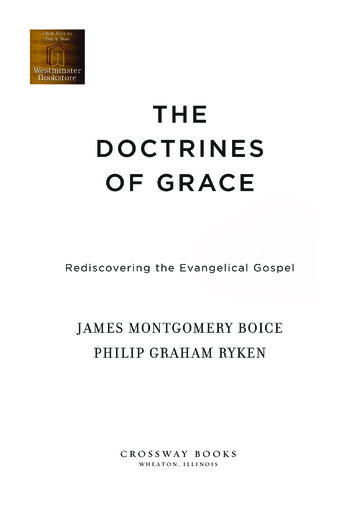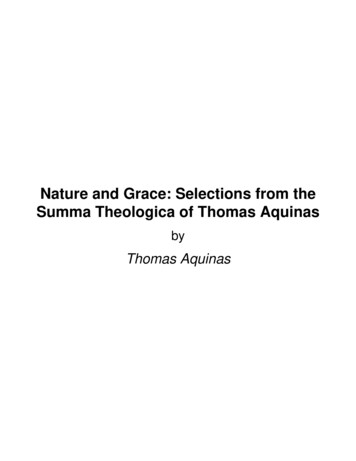
Transcription
Nature and Grace: Selections from theSumma Theologica of Thomas AquinasbyThomas Aquinas
About Nature and Grace: Selections from the Summa Theologica of ThomasAquinas by Thomas AquinasTitle:URL:Author(s):Publisher:Print Basis:Rights:Date Created:CCEL Subjects:LC Call no:LC Subjects:Nature and Grace: Selections from the Summa Theologica of re grace.htmlThomas, Aquinas, SaintGrand Rapids, MI: Christian Classics Ethereal LibraryPhiladelphia: The Westminster Press, 1954Public Domain2003-10-11All; Classic;BX1749.T515Christian DenominationsRoman Catholic ChurchTheology. Doctrine. Dogmatics
Nature and Grace: Selections from the Summa Theologica ofThomas AquinasThomas AquinasTable of ContentsAbout This Book. . . . . . . . . . . . . . . . . . . . . . . . . . . . . . . . . . . . . . p. iiTitle Page. . . . . . . . . . . . . . . . . . . . . . . . . . . . . . . . . . . . . . . . . . p. 1Miscellaneous Prefatory. . . . . . . . . . . . . . . . . . . . . . . . . . . . . . . . . p. 3General Editor’s Preface. . . . . . . . . . . . . . . . . . . . . . . . . . . . . . . . . p. 6Original Table of Contents. . . . . . . . . . . . . . . . . . . . . . . . . . . . . . . . p. 7General Introduction. . . . . . . . . . . . . . . . . . . . . . . . . . . . . . . . . . . p. 19Part I. Questions 1–4; 20–23. . . . . . . . . . . . . . . . . . . . . . . . . . . . . . p. 28Q. 1: What Sacred Doctrine Is, and What It Concerns. . . . . . . . . . . . . p. 28Art. 1: Whether Another Doctrine is Necessary, besides the PhilosophicalSciences. . . . . . . . . . . . . . . . . . . . . . . . . . . . . . . . . . . . . . . . . p. 28Art. 2: Whether Sacred Doctrine is a Science. . . . . . . . . . . . . . . . . p. 29Whether Sacred Doctrine is a Single Science. . . . . . . . . . . . . . . . . p. 30Whether Sacred Doctrine is a Practical Science. . . . . . . . . . . . . . . p. 31Whether Sacred Doctrine is Nobler than other Sciences. . . . . . . . . . p. 32Whether Sacred Doctrine is Wisdom. . . . . . . . . . . . . . . . . . . . . . . p. 33Art. 7: Whether God is the Subject of This Science. . . . . . . . . . . . . p. 34Whether Sacred Doctrine Proceeds by Argument. . . . . . . . . . . . . . p. 35Whether Sacred Doctrine should Use Metaphors. . . . . . . . . . . . . . . p. 36Art. 10: Whether One Passage of Sacred Scripture may have SeveralInterpretations. . . . . . . . . . . . . . . . . . . . . . . . . . . . . . . . . . . . . p. 38The Existence of God. . . . . . . . . . . . . . . . . . . . . . . . . . . . . . . . . . p. 39Art. 1: Whether it is Self-Evident that God Exists. . . . . . . . . . . . . . . p. 39Article 2: Whether God’s Existence can be Demonstrated. . . . . . . . . p. 41Art. 3: Whether God Exists. . . . . . . . . . . . . . . . . . . . . . . . . . . . . p. 42Q. 3: Of the Simple Nature of God. . . . . . . . . . . . . . . . . . . . . . . . . p. 44Art. 1: Whether God is a Body. . . . . . . . . . . . . . . . . . . . . . . . . . . p. 45Art. 2: Whether there is Composition of Form and Matter in God. . . . . p. 46Whether God is the Same as his Essence, or Nature. . . . . . . . . . . . p. 47Art. 4: Whether Essence and Existence are the Same in God. . . . . . . p. 49Whether God Belongs to a Genus. . . . . . . . . . . . . . . . . . . . . . . . p. 50Whether there is any Accident in God. . . . . . . . . . . . . . . . . . . . . . p. 51Whether God is Altogether Simple. . . . . . . . . . . . . . . . . . . . . . . . p. 52Art. 8: Whether God Enters into the Composition of Other Things. . . . . p. 53Q. 4: The Perfection of God. . . . . . . . . . . . . . . . . . . . . . . . . . . . . . p. 55Art. 1: Whether God is Perfect. . . . . . . . . . . . . . . . . . . . . . . . . . . p. 55iii
Nature and Grace: Selections from the Summa Theologica ofThomas AquinasThomas AquinasArt. 2: Whether the Perfections of all Things are in God. . . . . . . . . . p. 56Art. 3: Whether any Creature can be Like God. . . . . . . . . . . . . . . . p. 58Appendix to Q. 4, Art. 3. . . . . . . . . . . . . . . . . . . . . . . . . . . . . . . p. 59Q. 20: The Love of God. . . . . . . . . . . . . . . . . . . . . . . . . . . . . . . . p. 61Art. 1: Whether there is Love in God. . . . . . . . . . . . . . . . . . . . . . . p. 61Art. 2: Whether God Loves all Things. . . . . . . . . . . . . . . . . . . . . . p. 62Art. 3: Whether God Loves All Things Equally. . . . . . . . . . . . . . . . . p. 64Art. 4: Whether God Always Loves Better Things the More. . . . . . . . p. 65Q. 21: The Justice and Mercy of God. . . . . . . . . . . . . . . . . . . . . . . p. 67Art. 1: Whether there is Justice in God. . . . . . . . . . . . . . . . . . . . . . p. 67Art. 2: Whether God's Justice is Truth. . . . . . . . . . . . . . . . . . . . . . p. 69Art. 3: Whether there is Mercy in God. . . . . . . . . . . . . . . . . . . . . . p. 70Art. 4: Whether Justice and Mercy are Present in all God’s Works. . . . . p. 71Q. 22: Of Divine Providence. . . . . . . . . . . . . . . . . . . . . . . . . . . . . p. 72Art. 1: Whether Providence is Appropriately Ascribed to God. . . . . . . p. 73Art. 2: Whether All Things are under Divine Providence. . . . . . . . . . p. 74Art. 3: Whether God Provides for All Things Directly. . . . . . . . . . . . . p. 76Art. 4: Whether Providence Imposes a Necessity on what itProvides. . . . . . . . . . . . . . . . . . . . . . . . . . . . . . . . . . . . . . . . . p. 78Q. 23: Of Predestination. . . . . . . . . . . . . . . . . . . . . . . . . . . . . . . . p. 79Art. 1: Whether Men are Predestined by God. . . . . . . . . . . . . . . . . p. 79Art. 2: Whether Predestination Implies Anything in the Predestined. . . . p. 80Article 3: Whether God Rejects Any Man. . . . . . . . . . . . . . . . . . . . p. 82Art. 4: Whether the Predestined are Chosen by God. . . . . . . . . . . . p. 83Art. 5: Whether the Foreknowledge of Merits is the Cause ofPredestination. . . . . . . . . . . . . . . . . . . . . . . . . . . . . . . . . . . . . p. 84Art. 6: Whether Predestination is Certain. . . . . . . . . . . . . . . . . . . . p. 87Art. 7: Whether the Number of the Predestined is Certain. . . . . . . . . p. 88Art. 8: Whether Predestination can be Furthered by the Prayers of theDevout. . . . . . . . . . . . . . . . . . . . . . . . . . . . . . . . . . . . . . . . . . p. 90Of Sin. Prima Secundae, Questions 82, 83. . . . . . . . . . . . . . . . . . . . . p. 93Q. 82: The Essence of Original Sin. . . . . . . . . . . . . . . . . . . . . . . . . p. 93Art. 1: Whether Original Sin is a Habit. . . . . . . . . . . . . . . . . . . . . . p. 93Art. 2: Whether there are Many Original Sins in One Man. . . . . . . . . p. 94Art. 3: Whether Original Sin is Desire. . . . . . . . . . . . . . . . . . . . . . p. 95Art. 4: Whether Original Sin is in All Men Equally. . . . . . . . . . . . . . . p. 97Q. 85: The Effects of Sin. . . . . . . . . . . . . . . . . . . . . . . . . . . . . . . . p. 98Art. 1: Whether Sin Diminishes Natural Good. . . . . . . . . . . . . . . . . p. 98Art. 2: Whether the Whole Good of Human Nature can be Destroyed bySin. . . . . . . . . . . . . . . . . . . . . . . . . . . . . . . . . . . . . . . . . . . . . p. 99iv
Nature and Grace: Selections from the Summa Theologica ofThomas AquinasThomas AquinasArt. 3: Whether Weakness, Ignorance, Malice, and Desire are RightlyNamed as the Wounds of Nature Due to Sin. . . . . . . . . . . . . . . . . . p. 101Art. 4: Whether Privation of Mode, Species, and Order is the Effect ofSin. . . . . . . . . . . . . . . . . . . . . . . . . . . . . . . . . . . . . . . . . . . . . p. 102Art. 5: Whether Death and Other Defects of the Body are the Effects ofSin. . . . . . . . . . . . . . . . . . . . . . . . . . . . . . . . . . . . . . . . . . . . . p. 103Art. 6: Whether Death and Other Defects are Natural to Man. . . . . . . p. 105Treatise on Grace. Prima Secundae Questions 109—114. . . . . . . . . . . p. 107Q. 109: Concerning the External Principle of Human Actions, That Is, theGrace of God. . . . . . . . . . . . . . . . . . . . . . . . . . . . . . . . . . . . . . . p. 107Art. 1: Whether a Man can Know any Truth without Grace. . . . . . . . . p. 107Art. 2: Whether a Man can Will or do Good without Grace. . . . . . . . . p. 109Art. 3: Whether a Man can Love God above All Things by His NaturalPowers alone, without Grace. . . . . . . . . . . . . . . . . . . . . . . . . . . . p. 110Art. 4: Whether a Man can fulfil the Commandments of the Law by HisNatural Powers, without Grace. . . . . . . . . . . . . . . . . . . . . . . . . . . p. 112Art. 5: Whether a Man can Merit Eternal Life, without Grace. . . . . . . . p. 113Art. 6: Whether without Grace a Man can Prepare Himself forGrace. . . . . . . . . . . . . . . . . . . . . . . . . . . . . . . . . . . . . . . . . . . p. 114Art. 7: Whether a Man can rise from Sin without the Help of Grace. . . . p. 115Art. 8: Whether a Man can avoid Sin, without Grace. . . . . . . . . . . . . p. 117Art. 9: Whether, after receiving Grace, a Man can do Good and avoidSin, without further help of Grace. . . . . . . . . . . . . . . . . . . . . . . . . p. 118Art. 10: Whether a Man in Grace needs the help of Grace in order toPersevere. . . . . . . . . . . . . . . . . . . . . . . . . . . . . . . . . . . . . . . . p. 120Q. 110: The Essence of God’s Grace. . . . . . . . . . . . . . . . . . . . . . . p. 121Art. 1: Whether Grace denotes Something in the Soul. . . . . . . . . . . p. 121Art. 2: Whether Grace is a Quality of the Soul. . . . . . . . . . . . . . . . . p. 123Art. 3: Whether Grace is the same as Virtue. . . . . . . . . . . . . . . . . . p. 124Art. 4: Whether Grace is in the Soul’s Essence as its Subject, or in Oneof its Powers. . . . . . . . . . . . . . . . . . . . . . . . . . . . . . . . . . . . . . p. 126Q. 111: The Divisions of Grace. . . . . . . . . . . . . . . . . . . . . . . . . . . p. 127Art. 1: Whether Grace is appropriately divided into Sanctifying Grace andFree Grace. . . . . . . . . . . . . . . . . . . . . . . . . . . . . . . . . . . . . . . p. 127Art. 2: Whether Grace is appropriately divided into Operative andCo-operative Grace. . . . . . . . . . . . . . . . . . . . . . . . . . . . . . . . . . p. 129Art. 3: Whether Grace is Appropriately Divided into Prevenient andSubsequent Grace. . . . . . . . . . . . . . . . . . . . . . . . . . . . . . . . . . p. 130Art. 4: Whether Free Grace is Appropriately Divided by the Apostle. . . . p. 132Art. 5: Whether Free Grace is Nobler than Sanctifying Grace. . . . . . . p. 134v
Nature and Grace: Selections from the Summa Theologica ofThomas AquinasThomas AquinasQ. 112: The Cause of Grace. . . . . . . . . . . . . . . . . . . . . . . . . . . . . p. 135Art. 1: Whether God is the Sole Cause of Grace. . . . . . . . . . . . . . . p. 135Art. 2: Whether a Preparation or Disposition for Grace is required on thepart of man. . . . . . . . . . . . . . . . . . . . . . . . . . . . . . . . . . . . . . . p. 136Art. 3: Whether Grace is Bound to be given to One Who Prepares Himselffor Grace, or Who does what He can. . . . . . . . . . . . . . . . . . . . . . . p. 137Art. 4: Whether Grace is greater in One Man than in Another. . . . . . . p. 138Art. 5: Whether a Man can know that He has Grace. . . . . . . . . . . . . p. 140Q. 113: The Effects of Grace. . . . . . . . . . . . . . . . . . . . . . . . . . . . . p. 141Art. 1: Whether the Justification of the Ungodly is the Remission ofSins. . . . . . . . . . . . . . . . . . . . . . . . . . . . . . . . . . . . . . . . . . . . p. 142Art. 2: Whether an Infusion of Grace is required for the Remission of Guilt,which is the Justification of the Ungodly. . . . . . . . . . . . . . . . . . . . . p. 143Art. 3: Whether a Movement of the Free Will is required for the Justificationof the Ungodly. . . . . . . . . . . . . . . . . . . . . . . . . . . . . . . . . . . . . p. 144Art. 4: Whether a Movement of Faith is reojuired for the Justification ofthe Ungodly. . . . . . . . . . . . . . . . . . . . . . . . . . . . . . . . . . . . . . . p. 146Art. 5: Whether a Movement of the Free Will against Sin is required forthe justification of the ungodly. . . . . . . . . . . . . . . . . . . . . . . . . . . p. 147Art. 6: Whether the Remission of Sins should be Numbered with the thingsreequired for the Justification of the Ungodly. . . . . . . . . . . . . . . . . . p. 148Art. 7: Whether the Justification of the Ungodly is achievedInstantaneously or Gradually. . . . . . . . . . . . . . . . . . . . . . . . . . . . p. 150Art. 8: Whether the Infusion of Grace is the First of the Things requiredfor the Justification of the Ungodly, According to the Order ofNature. . . . . . . . . . . . . . . . . . . . . . . . . . . . . . . . . . . . . . . . . . p. 152Art. 9: Whether the Justification of the Ungodly is the Greatest Work ofG o d . . . . . . . . . . . . . . . . . . . . . . . . . . . . . . . . . . . . . . . . . . . . p. 154Art. 10: Whether the Justification of the Ungodly is a Miracle. . . . . . . p. 155Q. 114: Concerning Merit, Which Is the Effect of Co-operative Grace. . . . p. 156Art. 1: Whether a Man can Merit Anything from God. . . . . . . . . . . . . p. 157Art. 2: Whether One can Merit Eternal Life without Grace. . . . . . . . . p. 158Art. 3: Whether a Man in Grace can Merit Eternal Life Condignly. . . . . p. 159Art. 4: Whether Grace is the Principle of Merit through Charity morePrincipally than through Other Virtues. . . . . . . . . . . . . . . . . . . . . . p. 161Art. 5: Whether a Man can Merit the First Grace for Himself. . . . . . . . p. 162Art. 6: Whether a Man can Merit the First Grace for Another. . . . . . . p. 163Art. 7: Whether a Man can Merit His Restoration after a Lapse. . . . . . p. 164Art. 8: Whether a Man can Merit an Increase of Grace or Charity. . . . . p. 165Art. 9: Whether a Man can Merit Perseverance. . . . . . . . . . . . . . . . p. 166vi
Nature and Grace: Selections from the Summa Theologica ofThomas AquinasThomas AquinasArt. 10: Whether Temporal Goods can be Merited. . . . . . . . . . . . . . p. 168Treatise on the Theological Virtues. . . . . . . . . . . . . . . . . . . . . . . . . . p. 170I. On Faith. Secunda Secundae, Questions 1–7. . . . . . . . . . . . . . . . . p. 170Q. 1: The Object of Faith. . . . . . . . . . . . . . . . . . . . . . . . . . . . . . p. 170Art. 1: Whether the Object of Faith is the First Truth. . . . . . . . . . . . p. 170Art. 2: Whether the Object of Faith is Something Complex, in the Formof a Proposition. . . . . . . . . . . . . . . . . . . . . . . . . . . . . . . . . . . p. 171Art. 3: Whether what is False can be Held in Faith. . . . . . . . . . . . . p. 172Art. 4: Whether the Object of Faith can be Something Seen. . . . . . . p. 174Art. 5: Whether the Things of Faith can be Known Scientifically. . . . . p. 175Art. 6: Whether Matters of Faith ought to be Divided into CertainArticles. . . . . . . . . . . . . . . . . . . . . . . . . . . . . . . . . . . . . . . . . p. 177Art. 7: Whether the Articles of Faith have Increased with the Passingof Time. . . . . . . . . . . . . . . . . . . . . . . . . . . . . . . . . . . . . . . . . p. 178Art. 8: Whether the Articles of Faith are appropriately Enumerated. . . p. 180Art. 9: Whether the Articles of Faith are appropriately Set Forth in aSymbol. . . . . . . . . . . . . . . . . . . . . . . . . . . . . . . . . . . . . . . . . p. 183Art. 10: Whether it is for the Chief Pontiff to Draw Up the Symbol of theF a i t h . . . . . . . . . . . . . . . . . . . . . . . . . . . . . . . . . . . . . . . . . . p. 185Q. 2: The Act of Faith. . . . . . . . . . . . . . . . . . . . . . . . . . . . . . . . . p. 186Art. 1: Whether to Believe is to Think with Assent. . . . . . . . . . . . . p. 186Art. 2: Whether to Believe God, to Believe that there is a God, and toBelieve in God are rightly Distinguished as Acts of Faith. . . . . . . . . p. 188Art. 3: Whether, for Salvation, it is Necessary to Believe Anything whichis Beyond Natural Reason. . . . . . . . . . . . . . . . . . . . . . . . . . . . p. 189Art. 4: Whether it is Necessary to Believe such Things as can be Provedby Natural Reason. . . . . . . . . . . . . . . . . . . . . . . . . . . . . . . . . p. 190Art. 5: Whether a Man is required to Believe Anything Explicitly. . . . . p. 191Art. 6: Whether all Men Equally are required to have Explicit Faith. . . p. 193Art. 7: Whether Explicit Belief in the Mystery of the Incarnation of Christis Necessary for the Salvation of Everybody. . . . . . . . . . . . . . . . . p. 194Art. 8: Whether Explicit Belief in the Trinity is Necessary forSalvation. . . . . . . . . . . . . . . . . . . . . . . . . . . . . . . . . . . . . . . . p. 196Art. 9: Whether to Believe is Meritorious. . . . . . . . . . . . . . . . . . . p. 197Art. 10: Whether a Reason in Support of the Things of Faith Diminishesthe Merit of Faith. . . . . . . . . . . . . . . . . . . . . . . . . . . . . . . . . . . p. 199Q. 3: The Outward Act of Faith. . . . . . . . . . . . . . . . . . . . . . . . . . . p. 200Art. 1: Whether Confession is an Act of Faith. . . . . . . . . . . . . . . . p. 200Art. 2: Whether Confession of Faith is Necessary for Salvation. . . . . p. 202Q. 4: The Virtue Itself of Faith. . . . . . . . . . . . . . . . . . . . . . . . . . . p. 203vii
Nature and Grace: Selections from the Summa Theologica ofThomas AquinasThomas AquinasArt. 1: Whether this is a Satisfactory Definition of Faith: Faith is theSubstance of Things Hoped for, the Evidence of Things not Seen. . . . p. 203Art. 2: Whether Faith is in the Intellect as its Subject. . . . . . . . . . . p. 206Art. 3: Whether Charity is the Form of Faith. . . . . . . . . . . . . . . . . p. 207Art. 4: Whether Unformed Faith can become Formed, or ViceVersa. . . . . . . . . . . . . . . . . . . . . . . . . . . . . . . . . . . . . . . . . . p. 208Art. 5: Whether Faith is a Virtue. . . . . . . . . . . . . . . . . . . . . . . . . p. 209Art. 6: Whether Faith is a Single Virtue. . . . . . . . . . . . . . . . . . . . p. 211Art. 7: Whether Faith is the First of the Virtues. . . . . . . . . . . . . . . p. 212Art. 8: Whether Faith is more Certain than Science and the OtherIntellectual Virtues. . . . . . . . . . . . . . . . . . . . . . . . . . . . . . . . . . p. 214Q. 5: Of Those Who Have Faith. . . . . . . . . . . . . . . . . . . . . . . . . . p. 215Art. 1: Whether Angels and Man had Faith in their First State. . . . . . p. 215Art. 2: Whether Devils Have Faith. . . . . . . . . . . . . . . . . . . . . . . . p. 217Art. 3: Whether One Who Disbelieves One Article of Faith can HaveUnformed Faith in the Other Articles. . . . . . . . . . . . . . . . . . . . . . p. 218Art. 4: Whether Faith can be Greater in One Than in Another. . . . . . p. 220Q. 6: The Cause of Faith. . . . . . . . . . . . . . . . . . . . . . . . . . . . . . p. 221Art. 1: Whether Faith is Infused into Man by God. . . . . . . . . . . . . . p. 221Art. 2: Whether Unformed Faith is a Gift of God. . . . . . . . . . . . . . . p. 222Q. 7: The Effect of Faith. . . . . . . . . . . . . . . . . . . . . . . . . . . . . . . p. 224Art. 1: Whether Fear is an Effect of Faith. . . . . . . . . . . . . . . . . . . p. 224Art. 2: Whether Purification of the Heart is an Effect of Faith. . . . . . p. 225II. On Hope. Secunda Secundae, Questions 17—21. . . . . . . . . . . . . . p. 226Q. 17: Of Hope Considered in Itself. . . . . . . . . . . . . . . . . . . . . . . . p. 226Art. 1: Whether Hope is a Virtue. . . . . . . . . . . . . . . . . . . . . . . . . p. 226Art. 2: Whether Eternal Blessedness is the Proper Object of Hope. . . p. 227Art. 3: Whether One can Hope for the Eternal Blessedness ofAnother. . . . . . . . . . . . . . . . . . . . . . . . . . . . . . . . . . . . . . . . . p. 229Art. 4: Whether One may Lawfully Hope in Man. . . . . . . . . . . . . . p. 230Art. 5: Whether Hope is a Theological Virtue. . . . . . . . . . . . . . . . . p. 231Art. 6: Whether Hope is Distinct from the other TheologicalVirtues. . . . . . . . . . . . . . . . . . . . . . . . . . . . . . . . . . . . . . . . . p. 232Art. 7: Whether Hope precedes Faith. . . . . . . . . . . . . . . . . . . . . p. 233Art. 8: Whether Charity is Prior to Hope. . . . . . . . . . . . . . . . . . . . p. 234Q. 18: The Subject of Hope. . . . . . . . . . . . . . . . . . . . . . . . . . . . . p. 235Art. 1: Whether Hope is in the Will as its Subject. . . . . . . . . . . . . . p. 235Art. 2: Whether there is Hope in the Blessed. . . . . . . . . . . . . . . . . p. 236Art. 3: Whether there is Hope in the Damned. . . . . . . . . . . . . . . . p. 238Q. 19: The Gift of Fear. . . . . . . . . . . . . . . . . . . . . . . . . . . . . . . . p. 240viii
Nature and Grace: Selections from the Summa Theologica ofThomas AquinasThomas AquinasArt. 1: Whether God can be Feared. . . . . . . . . . . . . . . . . . . . . . p. 240Art. 2: Whether Fear is appropriately Divided into Filial, Initial, Servile,and Worldly Fear. . . . . . . . . . . . . . . . . . . . . . . . . . . . . . . . . . p. 241Art. 3: Whether Worldly Fear is always Evil. . . . . . . . . . . . . . . . . p. 243Art. 4: Whether Servile Fear is Good. . . . . . . . . . . . . . . . . . . . . . p. 244Art. 5: Whether Servile Fear is substantially the Same as FilialFear. . . . . . . . . . . . . . . . . . . . . . . . . . . . . . . . . . . . . . . . . . . p. 245Art. 6: Whether Servile Fear Remains when Charity is Present. . . . . p. 246Art. 7: Whether Fear is the Beginning of Wisdom. . . . . . . . . . . . . . p. 247Art. 8: Whether Initial Fear Differs Substantially from Filial Fear. . . . . p. 249Art. 9: Whether Fear is a Gift of the Holy Spirit. . . . . . . . . . . . . . . p. 250Art. 10: Whether Fear Diminishes as Charity Increases. . . . . . . . . . p. 251Art. 11: Whether Fear Remains in Heaven. . . . . . . . . . . . . . . . . . p. 252Art. 12: Whether Poverty of Spirit is the Beatitude which Correspondsto the Gift of Fear. . . . . . . . . . . . . . . . . . . . . . . . . . . . . . . . . . p. 254Q. 20: Of Despair. . . . . . . . . . . . . . . . . . . . . . . . . . . . . . . . . . . p. 255Art. 1: Whether Despair is a Sin. . . . . . . . . . . . . . . . . . . . . . . . . p. 255Art. 2: Whether there can be Despair without Unbelief. . . . . . . . . . p. 257Art. 3: Whether Despair is the Greatest of Sins. . . . . . . . . . . . . . . p. 258Art. 4: Whether Despair Arises from Listlessness. . . . . . . . . . . . . . p. 259Q. 21: Of Presumption. . . . . . . . . . . . . . . . . . . . . . . . . . . . . . . . p. 260Art. 1: Whether Presumption Relies on God, or on One’s OwnPower. . . . . . . . . . . . . . . . . . . . . . . . . . . . . . . . . . . . . . . . . . p. 261Art. 2: Whether Presumption is a Sin. . . . . . . . . . . . . . . . . . . . . . p. 262Art. 3: Whether Presumption is Opposed to Fear rather than toH o p e . . . . . . . . . . . . . . . . . . . . . . . . . . . . . . . . . . . . . . . . . . p. 263Art. 4: Whether Presumption is Caused by Vainglory. . . . . . . . . . . p. 264III. On Charity. Secunda Secundae. Questions 23, 27. . . . . . . . . . . . p. 265Q. 23: Of Charity, Considered in Itself. . . . . . . . . . . . . . . . . . . . . . p. 265Art. 1: Whether Charity is Friendship. . . . . . . . . . . . . . . . . . . . . . p. 266Art. 2: Whether Charity is Something Created in the Soul. . . . . . . . p. 267Art. 3: Whether Charity is a Virtue. . . . . . . . . . . . . . . . . . . . . . . p. 269Art. 4: Whether Charity is a Specific Virtue. . . . . . . . . . . . . . . . . . p. 270Art. 5: Whether Charity is a Single Virtue. . . . . . . . . . . . . . . . . . . p. 271Art. 6: Whether Charity is the Most Excellent of the Virtues. . . . . . . p. 272Art. 7: Whether there can be any True Virtue without Charity. . . . . . p. 273Art. 8: Whether Charity is the Form of the Virtues. . . . . . . . . . . . . p. 275Q. 27: Of the Principal Act of Charity, Which Is to Love. . . . . . . . . . . p. 276Art. 1: Whether to be Loved is More Proper to Charity than toLove. . . . . . . . . . . . . . . . . . . . . . . . . . . . . . . . . . . . . . . . . . . p. 276ix
Nature and Grace: Selections from the Summa Theologica ofThomas AquinasThomas AquinasArt. 2: Whether the Love which is an Act of Charity is the Same asBenevolence. . . . . . . . . . . . . . . . . . . . . . . . . . . . . . . . . . . . . p. 277Art. 3: Whether by Charity God is to be Loved on Account ofHimself. . . . . . . . . . . . . . . . . . . . . . . . . . . . . . . . . . . . . . . . . p. 279Art. 4: Whether God can be Loved Immediately in this Life. . . . . . . p. 280Art. 5: Whether God can be Loved Wholly. . . . . . . . . . . . . . . . . . p. 281Art. 6: Whether Love to God ought to have a Mode. . . . . . . . . . . . p. 282Art. 7: Whether it is more Meritorious to Love an Enemy than to Lovea Friend. . . . . . . . . . . . . . . . . . . . . . . . . . . . . . . . . . . . . . . . p. 283Art. 8: Whether it is more Meritorious to Love One’s Neighbour than toLove God. . . . . . . . . . . . . . . . . . . . . . . . . . . . . . . . . . . . . . . p. 285Bibliography. . . . . . . . . . . . . . . . . . . . . . . . . . . . . . . . . . . . . . . . . p. 287Biblical References. . . . . . . . . . . . . . . . . . . . . . . . . . . . . . . . . . . . p. 293Index of References to Other Authors and Sources. . . . . . . . . . . . . . . p. 293Indexes. . . . . . . . . . . . . . . . . . . . . . . . . . . . . . . . . . . . . . . . . . . . p. 321Index of Scripture References. . . . . . . . . . . . . . . . . . . . . . . . . . . . p. 321Latin Words and Phrases. . . . . . . . . . . . . . . . . . . . . . . . . . . . . . . p. 323Index of Pages of the Print Edition. . . . . . . . . . . . . . . . . . . . . . . . . p. 324x
Aquinas: Nature and GracevThomas AquinasVOLUME XINATURE AND GRACETHE LIBRARY OF CHRISTIAN CLASSICSvi7Volume XINATUREANDGRACESELECTIONS FROM THE SUMMA THEOLOGICAOF THOMAS AQUINASTranslated and Edited byA. M. FAIRWEATHER, M.A., S.T.M.Lecturer in PhilosophyUniversity of EdinburghPhiladelphiaTHE WESTMINSTER PRESS
Aquinas: Nature and Grace8Thomas AquinasPublished simultaneously in Great Britain and the United States of Americaby the S.C.M. Press, Ltd., London, and The Westminster Press, Philadelphia.First published MCMLIVLibrary of Congress Catalog Card Number . . 54–10259Printed in the United States of America2
Aquinas: Nature and GraceThomas AquinasGENERAL EDITORSJOHN BAILLIEPrincipal, New College,EdinburghJOHN T. McNEILLAuburn Professor of Church History,Union Theological Seminary,New YorkHENRY P. VAN DUSENPresident, Union Theological Seminary,New YorkiiTHE LIBRARY OF CHRISTIAN CLASSICSiiiVolumeI.Early Christian Fathers. Editor: CYRIL C.RICHARDSON, Washburn Professor of ChurchHistory, Union Theological Seminary, NewYork.II.Alexandrian Christianity. Editors: HENRYCHADWICK, Regius Professor of Divinity andCanon of Christ Church, Oxford; J. E. L.Oulton, late Professor of Divinity, TrinityCollege, Dublin.III.Christology of the Later Fathers. Editor: EDWARDROCHIE HARDY, Professor of Church History,Berkeley Divinity School, New Haven,Connecticut.IV.Cyril of Jerusalem and Nemesius of Emesa.Editor: WILLIAM TELFER, formerly Master ofSelwyn College, Cambridge.V.Early Latin Theology. Editor: S. L. GREEENSLADE,Regius Professor of Ecclesiastical History andCanon of Christ Church, University of Oxford.VI.Augustine: Earlier Writings. Editor: J. H. S.BURLEIGH, Professor of Ecclesiastical History,University of Edinburgh, and Principal of NewCollege, Edinburgh.VII.Augustine: Confessions and Enchiridion. Editor:ALBERT COOK OUTLER, Professor of Theology,Perkins School of Theology, SouthernMethodist University, Dallas, Texas.3
Aquinas: Nature and GraceThomas AquinasVIII.Augustine: Later Works. Editor: JOHN BURNABY,Fellow of Trinity College and formerly RegiusProfessor of Divinity, University of Cambridge.IX.Early Medieval Theology. Editor: GEORGE E.MCCRACKEN, Professor of Classical Languages,Drake University, Des Moines, Iowa.X.A Scholastic Miscellany: Anselm to Ockham.Editor: EUGENE R. FAIRWEATHER, AssociateProfessor of Dogmatic Theology and Ethics,Trinity College, University of Toronto,Toronto, Canada.XI.Nature and Grace: Selections from the SummaTheologica of Thomas Aquinas. Editor: A. M.FAIRWEATHER, Lecturer in Philosophy, Universityof Edinburgh.XII.Western Asceticism. Editor: OWEN CHADWICK,Master of Selwyn College and Dixie Professorof Ecclesiastical History, University ofCambridge.XIII.Late Medieval Mysticism. Editor: RAY C. PETRY,Professor of Church History, The DivinitySchool, Duke University, Durham, NorthCarolina.XIV.Advocates of Reform: From Wyclif to Erasmus.Editor: MATTHEW SPINKA, Waldo ProfessorEmeritus of Church History, HartfordTheological Seminary, Hartford, Connecticut.XV.Luther: Lectures on Romans. Editor: WILHELMPAUCK, Professor of Church History, UnionTheological Seminary, New York.XVI.Luther: Early Theological Works. Editor: JAMESATKINSON, Canon Theologian of Leicester.XVII.Luther and Erasmus on Free Will. Editor: E.GORDON RUPP, Professor of EcclesiasticalHistory, University of Manchester.XVIII.Luther: Letters of Spiritual Counsel. Editor:THEODORE G. TAPPERT, Schieren Professor ofthe Synod of New York and New England,Church History, Lutheran TheologicalSeminary, Philadelphia, Pennsylvania.iv4
Aquinas: Nature and GraceThomas AquinasXIX.Melanchthon and Bucer. Editor: WILHELM PAUCK,Professor of Church History, UnionTheological Seminary, New York.XX.-XXI.Calvin: Institutes of the Christian Religion.Editor: John T. McNeill, Auburn ProfessorEmeritus of Church History, UnionTheological Seminary, New York.XXII.Calvin: Theological Treatises. Editor: J. K. S.REID, Professor of Church Dogmatics, Universityof ROUTUNIAN, Professor of Systematic Theology,The Divinity School, University of Chicago.XXIV.Zwingli and Bullinger. Editor: G. W. BROMILEY,Professor of Church History and HistoricalTheology, Fuller Theological Seminary,Pasadena, California.XXV.Spiritual and Anabaptist Writers. Editors: GEORGEHUNTSTON WILLIAMS, Winn Professor ofEcclesiastical History, The Divinity
Nature and Grace: Selections from the Summa Theologica of Thomas Aquinas by Thomas Aquinas. This document has been generated from XSL (Extensible Stylesheet Language) source w


